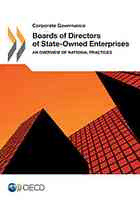
Boards of directors of state-owned enterprises : an overview of national practices. PDF
Preview Boards of directors of state-owned enterprises : an overview of national practices.
Corporate Governance C o r Boards of Directors of State-Owned p o r a Corporate Governance Enterprises t e G AN OVERVIEW OF NATIONAL PRACTICES ov Boards of Directors e r n Contents a n of State-Owned Enterprises Preface c e Executive summary AN OVERVIEW OF NATIONAL PRACTICES Introduction Chapter 1. The role of boards of directors Chapter 2. Board nomination framework and practices Chapter 3. Board composition: Constraints and guidelines Chapter 4. Board training and induction Chapter 5. Board remuneration Chapter 6. Boardroom efficiency Chapter 7. Board evaluations B o a r d s o f D ir e c t o r s o f S t a t e - O w n e d E n t e r p r is Consult this publication on line at http://dx.doi.org/10.1787/9789264200425-en. e s This work is published on the OECD iLibrary, which gathers all OECD books, periodicals and statistical databases. Visit www.oecd-ilibrary.org for more information. ISBN 978-92-64-18723-8 -:HSTCQE=V]\WX]: 26 2013 01 1 P Corporate Governance Boards of Directors of State-Owned Enterprises AN OVERVIEW OF NATIONAL PRACTICES ThisworkispublishedontheresponsibilityoftheSecretary-GeneraloftheOECD. Theopinionsexpressedandargumentsemployedhereindonotnecessarilyreflect theofficialviewsoftheOrganisationorofthegovernmentsofitsmembercountries. Thisdocumentandanymapincludedhereinarewithoutprejudicetothestatusof orsovereigntyoveranyterritory,tothedelimitationofinternationalfrontiersand boundariesandtothenameofanyterritory,cityorarea. Pleasecitethispublicationas: OECD(2013),BoardsofDirectorsofState-OwnedEnterprises:AnOverviewofNationalPractices, OECDPublishing. ISBN978-92-64-18723-8(print) ISBN978-92-64-20042-5(PDF) The statistical data for Israel are supplied by and under the responsibility of the relevant Israeli authorities.TheuseofsuchdatabytheOECDiswithoutprejudicetothestatusofthe Golan Heights, East Jerusalem and Israeli settlements in theWest Bank under the terms of internationallaw. CorrigendatoOECDpublicationsmaybefoundonlineat:www.oecd.org/publishing/corrigenda. ©OECD2013 Youcancopy,downloadorprintOECDcontentforyourownuse,andyoucanincludeexcerptsfromOECD publications,databasesandmultimediaproductsinyourowndocuments,presentations,blogs,websitesand teachingmaterials,providedthatsuitableacknowledgmentofthesourceandcopyrightownerisgiven.All requestsforpublicorcommercialuseandtranslationrightsshouldbesubmittedtorights@oecd.org.Requests forpermissiontophotocopyportionsofthismaterialforpublicorcommercialuseshallbeaddresseddirectly totheCopyrightClearanceCenter(CCC)[email protected]çaisd'exploitationdudroitde copie(CFC)[email protected]. FOREWORD Foreword T his report provides practical guidance on board practices for directors of state- owned enterprises and identifies a number of “good practices” based on national experiences of a large number of participating countries. It extends the guidance providedbyChapterVIoftheOECDGuidelinesontheCorporateGovernanceof State-Owned Enterprises on the “Responsibilities of Boards of State-Owned Enterprises”.The report draws information from a questionnaire-based exercise as wellaspreviouspublicationsandbackgroundpaperscommissionedbytheOECD. The report is an outcome of the OECDWorking Party on State Ownership and PrivatisationPracticesprojecton“Enhancingtheroleoftheboardsofdirectorsofstate- owned enterprises”. It was given final approval and declassified by theWP SOPP in December2012.ThedraftreportwaspreparedbySaraSultanandHansChristiansenof theCorporateAffairsDivisionoftheOECDDirectorateforFinancialandEnterpriseAffairs. SubstantiveinputwasprovidedbyJimColvinactingasexternalconsultanttotheOECD. Thedevelopmentofthereporthasalsobenefitedfromcomprehensiveconsultationswith the Business and Industry Advisory Committee (BIAC), the Trade Union Advisory Committee(TUAC),civilsociety,academiaandOECDpartnereconomies. BOARDSOFDIRECTORSOFSTATE-OWNEDENTERPRISES:ANOVERVIEWOFNATIONALPRACTICES©OECD2013 3 TABLEOFCONTENTS Table of contents Preface ......................................................... 7 Acronymsandabbreviations...................................... 9 Executivesummary.............................................. 11 Introduction .................................................... 17 Chapter1.Theroleofboardsofdirectors............................ 21 Definingrolesandresponsibilities ............................. 22 Conformancevs.performance................................. 25 Addingvalue................................................ 26 Notes ...................................................... 27 Bibliography................................................. 27 Chapter2.Boardnominationframeworksandpractices .............. 29 Exercisingthenominationandappointmentpowers ............. 31 Identificationandselectionofboardmembers................... 33 TheroleoftheBoardinnomination............................ 38 Therelationshipwithnon-stateshareholders ................... 43 Notes ...................................................... 45 Bibliography................................................. 45 Chapter3.Boardcomposition:Constraintsandguidelines ............ 47 Maintainingboardobjectivityandindependence................. 50 Employeerepresentativesontheboard ......................... 53 Eligibilityrequirements....................................... 55 Notes ...................................................... 59 Bibliography................................................. 59 Chapter4.Boardtrainingandinduction............................. 61 Inductionfornewboardmembers ............................. 63 SpecifictrainingaimedatSOEs................................ 64 OfftheShelfdirectortrainingprogrammes...................... 65 Bibliography................................................. 66 BOARDSOFDIRECTORSOFSTATE-OWNEDENTERPRISES:ANOVERVIEWOFNATIONALPRACTICES©OECD2013 5 TABLEOFCONTENTS Chapter5.Boardremuneration..................................... 67 Practicesandtrends.......................................... 68 Theroleofboardsinsettingremuneration...................... 71 Bibliography................................................. 71 Chapter6.Boardroomefficiency.................................... 73 Teamdynamics.............................................. 74 Workload................................................... 75 Sizelimits .................................................. 76 TheroleoftheChair ......................................... 78 Theuseofboardcommittees.................................. 79 Bibliography................................................. 80 Chapter7.Boardevaluations....................................... 81 Evaluationbytheownershipfunction .......................... 83 Boardselfreviews............................................ 85 Roleofexternalevaluators.................................... 86 Feedbackintonominationprocess ............................. 87 Bibliography................................................. 88 Annex.......................................................... 89 Tables 6.1. TeamdynamicsonSOEboards .............................. 75 6.2. Maximumboardsize....................................... 77 A.1. Nominationframework .................................... 90 A.2. Selectionandappointmentprocesses........................ 98 A.3. Remunerationofboardmembers............................ 104 A.4. Boardevaluationprocesses ................................. 107 Figures 1.1. Theroleoftheboardinathree-layergovernancestructure...... 23 2.1. NewZealandboardappointmentprocess..................... 36 3.1. Acontinuumofboardindependence......................... 50 6 BOARDSOFDIRECTORSOFSTATE-OWNEDENTERPRISES:ANOVERVIEWOFNATIONALPRACTICES©OECD2013 PREFACE Preface S tate-owned enterprises (SOEs) are an essential element in the international economic architecture. Across the OECD area and in emerging economies, they continue to dominate certain segments of the economy that matter greatly for the downstream competitiveness (notably in the utilities sector). In the face of growing expectationsforimprovedperformance,policymakershavefocusedtheirattentionon theroleofboardsofdirectors. Boards of directors play a fundamental role in corporate stewardship and performance.Overthelastdecade,OECDgovernmentshavesoughttoprofessionalise boards,ensuretheirindependenceandshieldthemfromadhocpoliticalintervention. Ingeneraltheseapproacheshaveworked;mostcountriesreportbetterqualityboard discourseandultimatelyimprovedSOEperformance.Yet,moreremainstobedoneto raise efficiency by implementing the aspirational standards of governance, accountabilityandtransparencyestablishedbytheOECDGuidelinesonCorporate GovernanceofState-OwnedEnterprises. Taking the Guidelines as a starting point, this publication develops practical guidanceonSOEboardpracticesaimedatpolicymakersandcorporatepractitioners.The reportisbasedonactualcountrypractices,butitdoesnotlimititselftoprovidingan overview of where we stand today. It takes important steps toward identifying what remains to be achieved.This report does not advocate a one-size-fits-all approach: different nationalapproachestoSOEownershipandoversight aretakenintoaccount andtheirconsequencesforwhatconstitutesgoodboardpracticesareconsidered. TheWorking Party on State Ownership and Privatisation Practices, the OECD body which Ihave the privilege of chairing, continuously monitors developments in this area. Assisting countries in implementing SOE board practices of the highest possiblestandardispartofitsmandate.ThisworkisbynomeanslimitedtoOECD membership.TheWorkingParty,initselfandthroughanumberofregionalnetworks across the globe, offers a forum for all interested SOE practitioners to turn to for inspirationandsupport. Throughthisreport,Ifeelthatwehavetakenanimportantstepforwardtoward identifyingstrongboardpracticesforstate-ownedenterprises.Iamconfidentthatpolicy BOARDSOFDIRECTORSOFSTATE-OWNEDENTERPRISES:ANOVERVIEWOFNATIONALPRACTICES©OECD2013 7 PREFACE makerswilltakestepstoundertakerelevantmeasuresinthisfield,andlookforwardto engagingwithawiderangeofactorstowardtheimplementationofourfindings. AndersBerg Chair,WorkingPartyonStateOwnership andPrivatisationPractices DeputyDirectorGeneral, NorwegianMinistryofTradeandIndustry 8 BOARDSOFDIRECTORSOFSTATE-OWNEDENTERPRISES:ANOVERVIEWOFNATIONALPRACTICES©OECD2013
